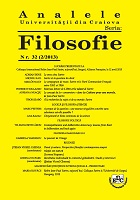COSMOPOLITANISM AND DELIBERATIVE DEMOCRACY: LESSONS FROM KANT TO DELIBERATION AND BACK AGAIN
COSMOPOLITANISM AND DELIBERATIVE DEMOCRACY: LESSONS FROM KANT TO DELIBERATION AND BACK AGAIN
Author(s): Áron Telegdi-CsetriSubject(s): Ethics / Practical Philosophy, Political Philosophy
Published by: Editura Universitaria Craiova
Keywords: Immanuel Kant; cosmopolitanism; deliberative democracy; transnational deliberation; publicity; history; morality;
Summary/Abstract: Examining a Kantian definition of political deliberation in the perspective of Kant’s cosmopolitanism, the article shows how it is rooted in the idea of humankind’s progressively moral teleology, or the universal normativity of freedom. Translated to concepts of rights, it is not any domestically enforceable positive right, but the universal right of reason that stands for transnational deliberation. Namely, it is not the institutions themselves enforcing transnational deliberation – and hence constitute the grounds of some form of cosmopolitan democracy – that make transnational decisionmaking deliberative, but the very fact of rational dialogue that is made possible through them. Through an excursus into the nation of devils argument, the difference between a moral and a natural progress is emphasized within this context, as well as the role of philosophy in this process. The difference between law and morality is unfolded as a difference between mere historical contingency and a progressive individual involvement into this very historicity. Thus, the enlightenment of publics, necessary for any Kantian political argument, is reconstructed on the grounds of a practical philosophy as against a philosophy of history or the state.
Journal: ANALELE UNIVERSITĂȚII DIN CRAIOVA. SERIA FILOSOFIE
- Issue Year: 2/2013
- Issue No: 32
- Page Range: 130-147
- Page Count: 18
- Language: English

